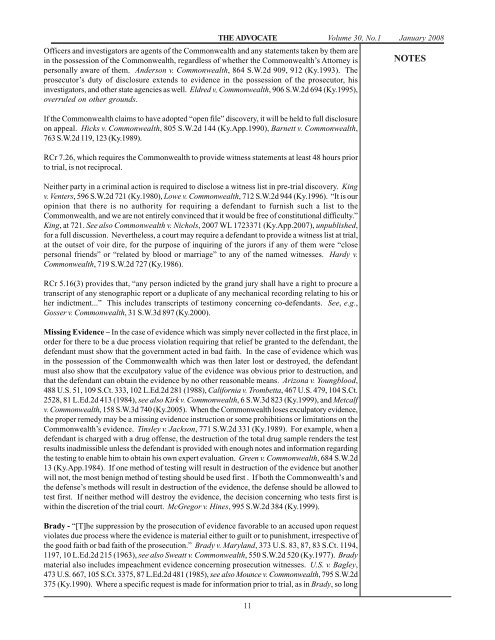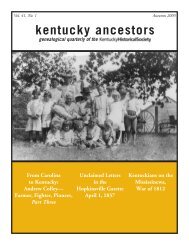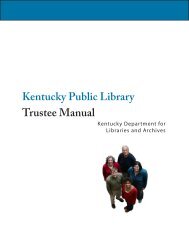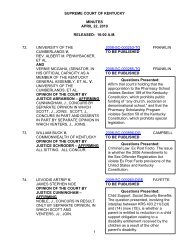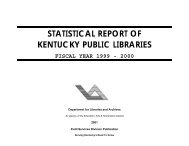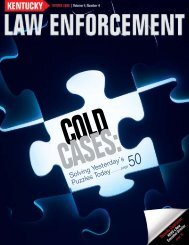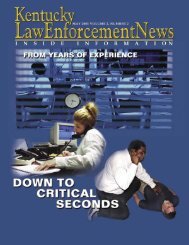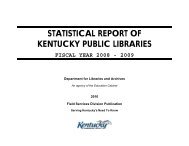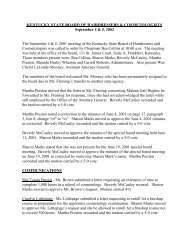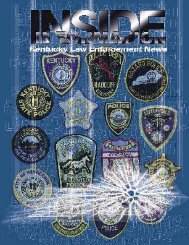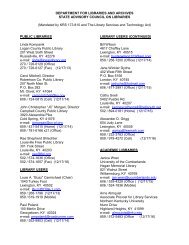Jan08 Advo.pmd - e-archives Home
Jan08 Advo.pmd - e-archives Home
Jan08 Advo.pmd - e-archives Home
Create successful ePaper yourself
Turn your PDF publications into a flip-book with our unique Google optimized e-Paper software.
THE ADVOCATE Volume 30, No.1 January 2008<br />
Officers and investigators are agents of the Commonwealth and any statements taken by them are<br />
in the possession of the Commonwealth, regardless of whether the Commonwealth’s Attorney is<br />
personally aware of them. Anderson v. Commonwealth, 864 S.W.2d 909, 912 (Ky.1993). The<br />
prosecutor’s duty of disclosure extends to evidence in the possession of the prosecutor, his<br />
investigators, and other state agencies as well. Eldred v, Commonwealth, 906 S.W.2d 694 (Ky.1995),<br />
overruled on other grounds.<br />
If the Commonwealth claims to have adopted “open file” discovery, it will be held to full disclosure<br />
on appeal. Hicks v. Commonwealth, 805 S.W.2d 144 (Ky.App.1990), Barnett v. Commonwealth,<br />
763 S.W.2d 119, 123 (Ky.1989).<br />
RCr 7.26, which requires the Commonwealth to provide witness statements at least 48 hours prior<br />
to trial, is not reciprocal.<br />
Neither party in a criminal action is required to disclose a witness list in pre-trial discovery. King<br />
v. Venters, 596 S.W.2d 721 (Ky.1980), Lowe v. Commonwealth, 712 S.W.2d 944 (Ky.1996). “It is our<br />
opinion that there is no authority for requiring a defendant to furnish such a list to the<br />
Commonwealth, and we are not entirely convinced that it would be free of constitutional difficulty.”<br />
King, at 721. See also Commonwealth v. Nichols, 2007 WL 1723371 (Ky.App.2007), unpublished,<br />
for a full discussion. Nevertheless, a court may require a defendant to provide a witness list at trial,<br />
at the outset of voir dire, for the purpose of inquiring of the jurors if any of them were “close<br />
personal friends” or “related by blood or marriage” to any of the named witnesses. Hardy v.<br />
Commonwealth, 719 S.W.2d 727 (Ky.1986).<br />
RCr 5.16(3) provides that, “any person indicted by the grand jury shall have a right to procure a<br />
transcript of any stenographic report or a duplicate of any mechanical recording relating to his or<br />
her indictment...” This includes transcripts of testimony concerning co-defendants. See, e.g.,<br />
Gosser v. Commonwealth, 31 S.W.3d 897 (Ky.2000).<br />
Missing Evidence – In the case of evidence which was simply never collected in the first place, in<br />
order for there to be a due process violation requiring that relief be granted to the defendant, the<br />
defendant must show that the government acted in bad faith. In the case of evidence which was<br />
in the possession of the Commonwealth which was then later lost or destroyed, the defendant<br />
must also show that the exculpatory value of the evidence was obvious prior to destruction, and<br />
that the defendant can obtain the evidence by no other reasonable means. Arizona v. Youngblood,<br />
488 U.S. 51, 109 S.Ct. 333, 102 L.Ed.2d 281 (1988), California v. Trombetta, 467 U.S. 479, 104 S.Ct.<br />
2528, 81 L.Ed.2d 413 (1984), see also Kirk v. Commonwealth, 6 S.W.3d 823 (Ky.1999), and Metcalf<br />
v. Commonwealth, 158 S.W.3d 740 (Ky.2005). When the Commonwealth loses exculpatory evidence,<br />
the proper remedy may be a missing evidence instruction or some prohibitions or limitations on the<br />
Commonwealth’s evidence. Tinsley v. Jackson, 771 S.W.2d 331 (Ky.1989). For example, when a<br />
defendant is charged with a drug offense, the destruction of the total drug sample renders the test<br />
results inadmissible unless the defendant is provided with enough notes and information regarding<br />
the testing to enable him to obtain his own expert evaluation. Green v. Commonwealth, 684 S.W.2d<br />
13 (Ky.App.1984). If one method of testing will result in destruction of the evidence but another<br />
will not, the most benign method of testing should be used first . If both the Commonwealth’s and<br />
the defense’s methods will result in destruction of the evidence, the defense should be allowed to<br />
test first. If neither method will destroy the evidence, the decision concerning who tests first is<br />
within the discretion of the trial court. McGregor v. Hines, 995 S.W.2d 384 (Ky.1999).<br />
Brady - “[T]he suppression by the prosecution of evidence favorable to an accused upon request<br />
violates due process where the evidence is material either to guilt or to punishment, irrespective of<br />
the good faith or bad faith of the prosecution.” Brady v. Maryland, 373 U.S. 83, 87, 83 S.Ct. 1194,<br />
1197, 10 L.Ed.2d 215 (1963), see also Sweatt v. Commonwealth, 550 S.W.2d 520 (Ky.1977). Brady<br />
material also includes impeachment evidence concerning prosecution witnesses. U.S. v. Bagley,<br />
473 U.S. 667, 105 S.Ct. 3375, 87 L.Ed.2d 481 (1985), see also Mounce v. Commonwealth, 795 S.W.2d<br />
375 (Ky.1990). Where a specific request is made for information prior to trial, as in Brady, so long<br />
11<br />
NOTES


